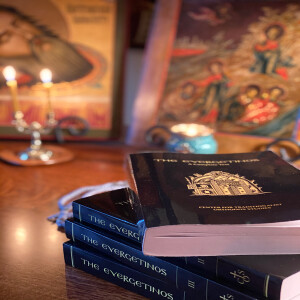
The beauty of the writings of the fathers and in particular the lived experiences of the monks as described in the Evergetinos brings to life the spiritual life in an unparalleled fashion. They show us that there is no part of the spiritual life that can be seen outside the context of our relationship with God. In other words, there is no spiritual practice or discipline, no spiritual fruit or experience that does not begin and end with God and his grace.
Contrition is love! It is rooted in the growing experience of loss that one has by turning away from God because of one’s attachment to the things of this world or to one’s own judgment. When contrition emerges within the human heart, when the sword of sorrow that pierced through our Lord‘s heart allows us to taste its metal, and when tears begin to flow without measure, one does not distract oneself from the experience. To do so would be to turn away from God.
So often we want to control or manage, not only circumstances, but our experience of what is going on internally and in our relationship with God. It is difficult for us to allow ourselves to be taken by the hand and guided by Christ along the path that leads to our sanctification and intimacy with him. Strangely enough, we often become the focus of our own spiritual life; how well we are doing things, the disciplines that we keep, the sins that we avoid, the regularity of our prayer. However, we are shown that God can bestow upon a soul the gift of contrition and tears in a moment of domestic work. God does this in order that we might have no illusion about where this gift comes from. Whenever we tie contrition to what it is that we are doing, we either take hold of it as if it were our own or we seek to distract ourselves from it. Often it is emotionally hard for us to linger long in such sorrow and humility. Yet the fathers show us that this gift is precious, not to be turned away from quickly, but rather fostered.
Such teaching becomes a stark reminder that our faith is rooted in a relationship with a God who has come to us to heal us; that humble sorrow and that flood of tears become the very means by which He lifts us up.
---
Text of chat during the group:
00:10:54 Bob Čihák, AZ: P. 254, 2nd paragraph of # 18
00:11:15 Adam Paige: Reacted to "515714551_18143336329396209_7085918453142515818_n.jpg" with ☦️
00:15:36 Bob Čihák, AZ: P. 254, 2nd paragraph of # 18
00:26:16 Una: So don't stop weaving the baskets?
00:31:18 Kathleen: God have mercy on our lack of awareness.
00:38:57 Anthony: When I try to pray the "right" way, my mind usually trips me up. Prayer is easier when walking, not paying attention to "I have to do this right....oh no, bad thought, distraction.....I have to do this right.....pay attention, why did you have that distraction....." etc.
00:40:17 Forrest Cavalier: Reacted to "When I try to pray t..." with 👍
00:45:40 Anthony: Legalism can turn into "magic."
00:46:00 Myles Davidson: Reacted to "Legalism can turn in..." with 👍
00:46:34 Myles Davidson: Replying to "Legalism can turn in..."
Magical thinking yes
00:48:00 Forrest Cavalier: My dad got back in the church 2 years before he died. He wondered why it was so much easier for him to cry. I wondered too. From these paragraphs, now I know.
00:56:54 Andrew Zakhari: Psalm 56:8 "You have kept count of my tossings; put my tears in your bottle." God lingers over our tears long enough to collect them. I don't think we sit with them long enough to even recognize what they are about.
01:03:41 Anthony: India ink or Chinese ink
01:04:55 Forrest Cavalier: Greek is "hot iron"
01:05:09 Forrest Cavalier: πυρωμένον σίδηρον
01:06:30 Anthony: Replying to "πυρωμένον σίδηρον"
I apologize for interrupting you Forrest
01:11:23 Maureen Cunningham: Thank You Father Blessing
01:11:33 Forrest Cavalier: Replying to "πυρωμένον σίδηρον"
My fault.
01:11:35 Rebecca Thérèse: Thank you☺️
01:11:46 Troy Amaro: Thank You Father
01:11:49 Catherine Opie: Thank you Fr. God bless
4 days ago
The teaching from The Evergetinos reveals that the spiritual life cannot be separated from a living relationship with God. Every practice, discipline, or spiritual fruit begins and ends with His grace. At its heart lies contrition, which is not self-pity but a deep love marked by sorrow for turning away from God. This sorrow, likened to tasting the metal of the sword that pierced Christ, is a grace—not something we produce, but something we receive. We are often tempted to control our spiritual experiences—judging our prayer, measuring our progress, or managing our inner state. But the fathers teach that such efforts turn us inward and away from God. True contrition often comes unbidden, even during ordinary tasks, reminding us that God gives this gift freely and unexpectedly. The danger lies in making ourselves the focus: how disciplined we are, how often we pray, what sins we avoid. Yet grace does not respond to performance. It breaks through where and when God chooses. And when the grace of tears comes, we must not push it away because of discomfort—it is God drawing near. Group reflections echoed this truth. Forrest spoke of his father crying more easily after returning to the Church—now understood as grace. Andrew cited Psalm 56:8, reminding us that God treasures our tears. Anthony noted that over-managing prayer invites distraction, while simplicity—like walking—can create space for grace. This teaching anchors the soul: true spiritual life is not self-centered striving but surrender to divine love. Contrition is not weakness but communion. God heals through tears, not despite them. We are lifted not by strength but by the humble sorrow that opens us to Him.